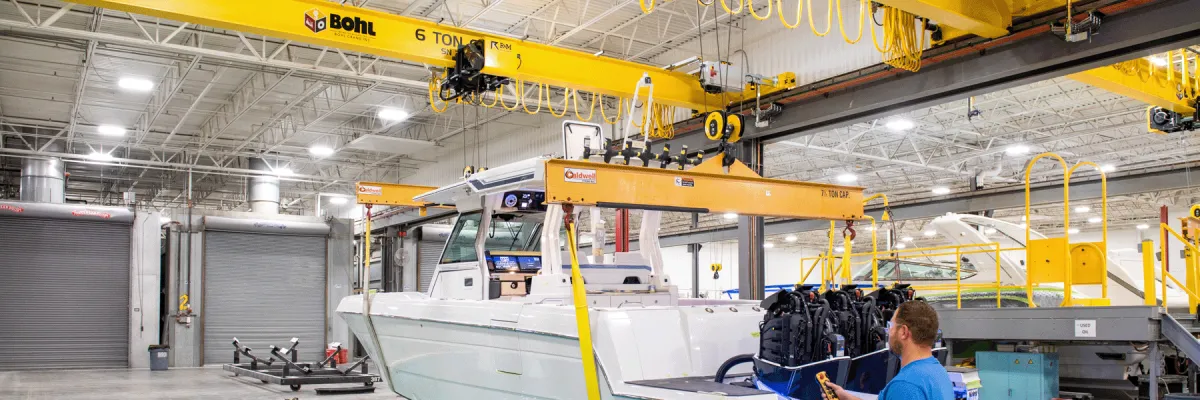
The Application: It was a tight headroom application given that the existing building had 20’-10 ½” truss height and 18’-2” crane rail height.
Thomas Velker, Project Engineer at Bohl Crane, set the scene: “There is a pond out front and pool bays inside. The pools are used to test the motors in the boats; they use the cranes to lift the boats in and out of these pools,” he says.
The material handling needs of Formula Boats had changed over time. Most of the previously existing cranes were removed, as they had mismatched hoists and speeds, making way for similar but updated cranes. Below-the-hook equipment, such as nylon slings and spreader bars, was retained.
The Challenge: A total of eight bays needed to be covered and Velker reiterated that the major challenge was confined space.
“They were working within an existing building with an already tight lifting application,” he says.
“We had to come in and reinforce their building steel along the runways and building columns so that the runways for the cranes could handle the additional capacity. We had to keep our sizing within the existing crane window despite the need for even bigger cranes; we did this by notching the girders and other methods.”
Additionally, the customer did not want to go through the process of changing out all of their runways for the added capacity. This would have been very expensive and caused a lot of downtime.
John Workinger, Facility Maintenance Manager at Formula Boats, says, “We had concerns about continuing production during the hoist upgrades.”
Bohl Crane worked with Formula to uncover how much weight the bow of each boat required as compared to the stern in regard to capacity. The stern, being heavier, required an 8-ton crane; and the bow, being lighter, required a 6-ton crane. Tandem radio remote controls are utilized to get the two cranes to lift the boat together.
While the lifting equipment is only required to work to moderate duty, they are operated daily, during every shift.
The Solution: “One of our more experienced salespeople had the idea to add intermediate columns in the middle of the runway. This alone allowed them to keep all the runways and have minimal downtime,” says Velker.
Bohl Crane selected standard SX wire rope hoists and crane kits, utilizing fully side-mount end trucks, to keep the cranes in as tight a window as possible. The spans of each crane were comparable at approximately 47’-6”. Each bay got an 8-ton and a 6-ton capacity crane to cover the weight of the bigger boats.
Bohl Crane added a radio remote control with A / B / Both selector switch. This allows them to be able to move the bridges at the same time.
In addition to the larger bay cranes, eight new 2-ton capacity underhung R&M cranes were installed in a smaller bay area.
“All of this cannot be done without great communication through on-site Bohl Crane employees and our on-the-floor supervisors and employees,” says Workinger.
The Results: The low headroom of the SX wire rope hoists allowed Bohl Crane and Thunderbird to avoid any unnecessary costs that would have been caused by structural alternations.
Workinger, who oversees the production facility and two other storage buildings, says, “It went flawlessly. Bohl Crane did an excellent job of communicating with our production supervisors and staff to accommodate our schedule, even in this crazy world of shipping delays.”
The entire process lasted from January to September. Velker says, “We can learn a great deal from the experience of our team; from sales to engineering to our field crews.”
He continues, “Our crew leader, Durke Ferris, is very cognizant of safety anytime he is on a job site. The goal was to remove and install bridges all while they are running production. Durke and the crew worked diligently around all existing equipment and Thunderbird workers to safely and efficiently get the job done.”
Workinger adds, “Our hoists are working and performing to perfection; they run really smooth, and all the support has been greatly appreciated.”
